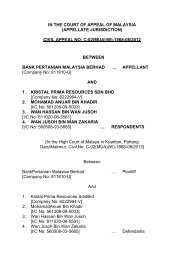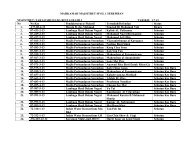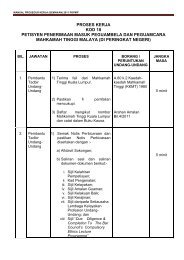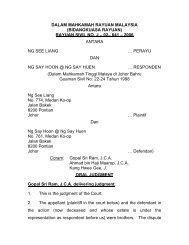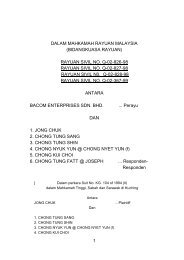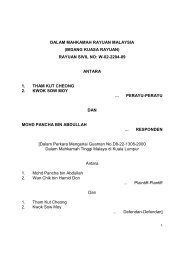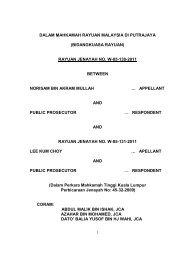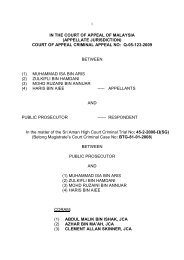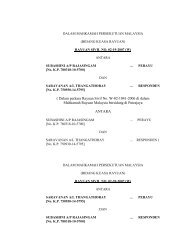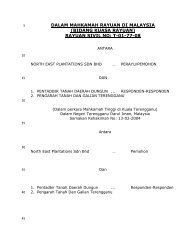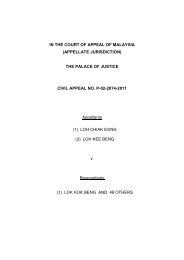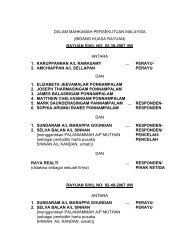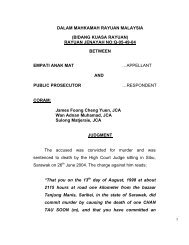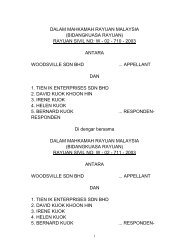in the court of appeal malaysia (appellate jurisdiction)
in the court of appeal malaysia (appellate jurisdiction)
in the court of appeal malaysia (appellate jurisdiction)
You also want an ePaper? Increase the reach of your titles
YUMPU automatically turns print PDFs into web optimized ePapers that Google loves.
What must a petitioner show <strong>in</strong> order to justify an order under s<br />
459 or an order to w<strong>in</strong>d up? The grounds for w<strong>in</strong>d<strong>in</strong>g up are<br />
that it is ‘just and equitable’ to do so. The grounds for an order<br />
under s 459 are that<br />
…<br />
‘<strong>the</strong> company’s affairs are be<strong>in</strong>g or have been conducted<br />
<strong>in</strong> a manner which is unfairly prejudicial to <strong>the</strong> <strong>in</strong>terests<br />
<strong>of</strong> its members generally or <strong>of</strong> some part <strong>of</strong> its members<br />
(<strong>in</strong>clud<strong>in</strong>g at least [<strong>the</strong> petitioner]).<br />
‘Unfairly prejudicial’ is deliberately imprecise language<br />
which was chosen by Parliament because its earlier attempt <strong>in</strong> s<br />
210 <strong>of</strong> <strong>the</strong> Companies Act 1948 to provide a similar remedy<br />
had been too restrictively construed. The earlier section had<br />
used <strong>the</strong> word ‘oppressive’, which <strong>the</strong> House <strong>of</strong> Lords <strong>in</strong><br />
Scottish Co-op Wholesale Society Ltd v Meyer [1958] 3 All ER<br />
66 [1959] AC 324, [1959] 3 WLR 404 said meant<br />
‘burdensome, harsh and wrongful’. This gave rise to some<br />
uncerta<strong>in</strong>ty as to whe<strong>the</strong>r ‘wrongful’ required actual illegality<br />
or <strong>in</strong>vasion <strong>of</strong> legal rights. The Jenk<strong>in</strong>s Committee on<br />
Company Law, which reported <strong>in</strong> 1962, thought that it should<br />
not. To make this clear, it recommended <strong>the</strong> use <strong>of</strong> <strong>the</strong> term<br />
‘unfairly prejudicial’, which Parliament somewhat tardily<br />
adopted <strong>in</strong> s 75 <strong>of</strong> <strong>the</strong> Companies Act 1980. This section is<br />
reproduced (with m<strong>in</strong>or amendment) <strong>in</strong> <strong>the</strong> present s 459 <strong>of</strong> <strong>the</strong><br />
Companies Act 1985.<br />
….<br />
In decid<strong>in</strong>g what is fair or unfair for <strong>the</strong> purposes <strong>of</strong> s 459, it is<br />
important to have <strong>in</strong> m<strong>in</strong>d that fairness is be<strong>in</strong>g used <strong>in</strong> <strong>the</strong><br />
context <strong>of</strong> a commercial relationship. The articles <strong>of</strong><br />
association are just what <strong>the</strong>ir name implies: <strong>the</strong> contractual<br />
terms which govern <strong>the</strong> relationships <strong>of</strong> <strong>the</strong> shareholders with<br />
<strong>the</strong> company and each o<strong>the</strong>r. They determ<strong>in</strong>e <strong>the</strong> powers <strong>of</strong> <strong>the</strong><br />
board and <strong>the</strong> company <strong>in</strong> general meet<strong>in</strong>g and everyone who<br />
becomes a member <strong>of</strong> a company is taken to have agreed to<br />
<strong>the</strong>m. S<strong>in</strong>ce keep<strong>in</strong>g promises and honour<strong>in</strong>g agreements is<br />
probably <strong>the</strong> most important element <strong>of</strong> commercial fairness,<br />
36



